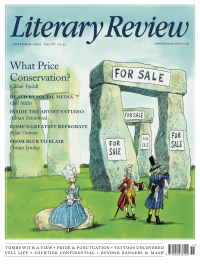Florence Hazrat
Shouty Jane Austen?
On the evolution of the exclamation mark
Empire-line dresses, top hats, elegant balls and proper social etiquette. The world of Jane Austen’s novels is one of poise and restraint, both in manner and in literary style. Or so we think. But what if the queen of the balanced sentence was actually a more vibrant and (dare we say it) sloppier writer than we assume? What if Austen’s original punctuation shows a writer freely skating from thought to thought and allowing emotion to bubble up from the paper, only for this to be pierced by editorial interventions, dampening her textual liveliness?
Professor Kathryn Sutherland of Oxford University has published Austen’s surviving manuscripts both online and in print, permitting us to peep into the writer’s works in progress. Looking over Jane’s shoulder, we realise, for example, just how exclaim-happy she was, peppering her drafts with exclamation marks (as well as dashes, underlinings, crossings-outs and blotted letters). Surviving drafts of two of the chapters of her posthumously published novel Persuasion, probably nearly finished pieces as she sent them to her publisher for reading over, let us see the before and after states of Austen’s works. In this passage, the long-in-love couple Anne Elliot and Captain Wentworth (relationship status: it’s complicated) reflect on their years of will-they-won’t-they. The print version of 1818 reads thus:
‘You should have distinguished,’ replied Anne. ‘You should not have suspected me now; the case so different, and my age so different. If I was wrong in yielding to persuasion once, remember that it was to persuasion exerted on the side of safety, not of risk. When I yielded, I thought it was to duty; but no duty could be called in aid here. In marrying a man indifferent to me, all risk would have been incurred, and all duty violated.’
The sobriety and self-control exuded by the full stops and the semicolon after the weighty ‘duty’ stand in stark contrast to the vitality of the original manuscript, with its capitalised words, emphatic underscorings, shoal of dashes and single bold exclamation mark:
‘You should have distinguished – replied Anne –

Sign Up to our newsletter
Receive free articles, highlights from the archive, news, details of prizes, and much more.@Lit_Review
Follow Literary Review on Twitter
Twitter Feed
It wasn’t until 1825 that Pepys’s diary became available for the first time. How it was eventually decrypted and published is a story of subterfuge and duplicity.
Kate Loveman tells the tale.
Kate Loveman - Publishing Pepys
Kate Loveman: Publishing Pepys
literaryreview.co.uk
Arthur Christopher Benson was a pillar of the Edwardian establishment. He was supremely well connected. As his newly published diaries reveal, he was also riotously indiscreet.
Piers Brendon compares Benson’s journals to others from the 20th century.
Piers Brendon - Land of Dopes & Tories
Piers Brendon: Land of Dopes & Tories - The Benson Diaries: Selections from the Diary of Arthur Christopher Benson by Eamon Duffy & Ronald Hyam (edd)
literaryreview.co.uk
Of the siblings Gwen and Augustus John, it is Augustus who has commanded most attention from collectors and connoisseurs.
Was he really the finer artist, asks Tanya Harrod, or is it time Gwen emerged from her brother’s shadow?
Tanya Harrod - Cut from the Same Canvas
Tanya Harrod: Cut from the Same Canvas - Artists, Siblings, Visionaries: The Lives and Loves of Gwen and Augustus John by Judith Mackrell
literaryreview.co.uk